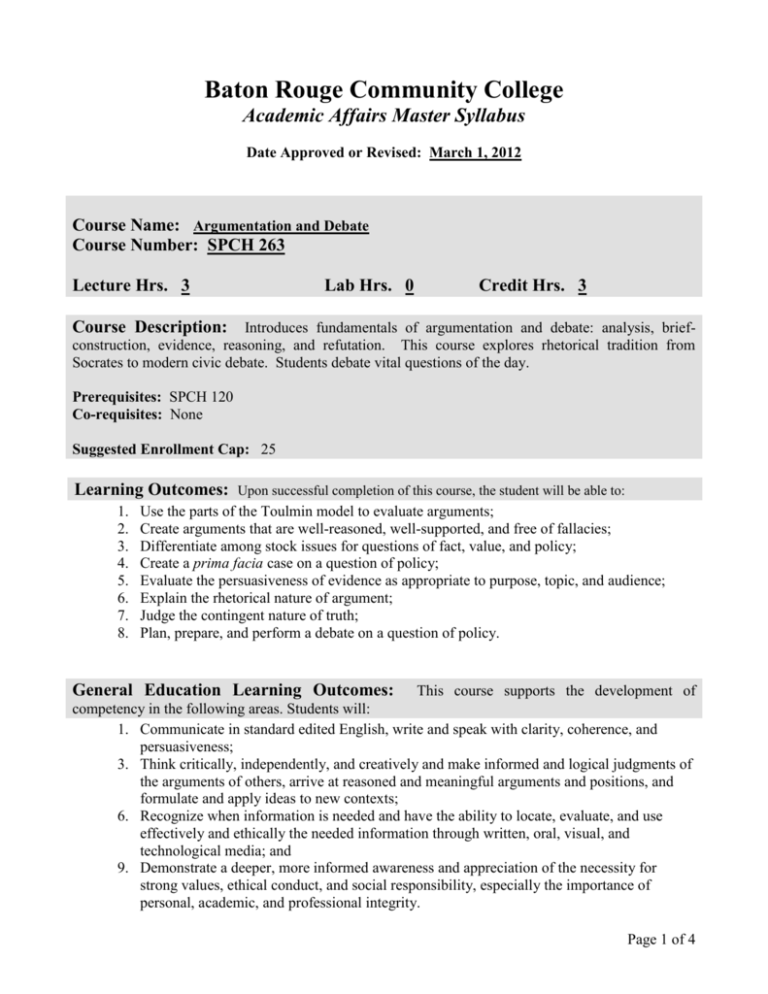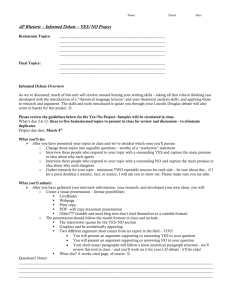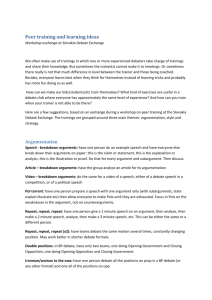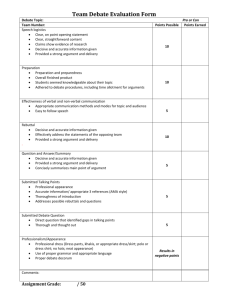SPCH 263 - Baton Rouge Community College
advertisement

Baton Rouge Community College Academic Affairs Master Syllabus Date Approved or Revised: March 1, 2012 Course Name: Argumentation and Debate Course Number: SPCH 263 Lecture Hrs. 3 Lab Hrs. 0 Credit Hrs. 3 Course Description: Introduces fundamentals of argumentation and debate: analysis, briefconstruction, evidence, reasoning, and refutation. This course explores rhetorical tradition from Socrates to modern civic debate. Students debate vital questions of the day. Prerequisites: SPCH 120 Co-requisites: None Suggested Enrollment Cap: 25 Learning Outcomes: 1. 2. 3. 4. 5. 6. 7. 8. Upon successful completion of this course, the student will be able to: Use the parts of the Toulmin model to evaluate arguments; Create arguments that are well-reasoned, well-supported, and free of fallacies; Differentiate among stock issues for questions of fact, value, and policy; Create a prima facia case on a question of policy; Evaluate the persuasiveness of evidence as appropriate to purpose, topic, and audience; Explain the rhetorical nature of argument; Judge the contingent nature of truth; Plan, prepare, and perform a debate on a question of policy. General Education Learning Outcomes: This course supports the development of competency in the following areas. Students will: 1. Communicate in standard edited English, write and speak with clarity, coherence, and persuasiveness; 3. Think critically, independently, and creatively and make informed and logical judgments of the arguments of others, arrive at reasoned and meaningful arguments and positions, and formulate and apply ideas to new contexts; 6. Recognize when information is needed and have the ability to locate, evaluate, and use effectively and ethically the needed information through written, oral, visual, and technological media; and 9. Demonstrate a deeper, more informed awareness and appreciation of the necessity for strong values, ethical conduct, and social responsibility, especially the importance of personal, academic, and professional integrity. Page 1 of 4 2. Apply core values in making ethical, personal, social, and professional decisions. Assessment Measures: Instructors may use a variety of assessment measures to assess student performance. But, the following assessments will be used in all sections: 1. Common rubrics for debate on a question of policy to assess learning outcomes 2, 4, 5 & 8; and 2. Short answer/essay questions to assess learning outcomes 1, 3, 6, & 7. Information to be included on the Instructors’ Course Syllabi: Disability Statement: Baton Rouge Community College seeks to meet the needs of its students in many ways. See the Office of Disability Services to receive suggestions for disability statements that should be included in each syllabus. Grading: The College grading policy should be included in the course syllabus. Any special practices should also go here. This should include the instructor’s and/or the department’s policy for make-up work. For example in a speech course, “Speeches not given on due date will receive no grade higher than a sixty” or “Make-up work will not be accepted after the last day of class.” Attendance Policy: Include the overall attendance policy of the college. Instructors may want to add additional information in individual syllabi to meet the needs of their courses. General Policies: Instructors’ policy on the use of things such as beepers and cell phones and/or hand held programmable calculators should be covered in this section. Cheating and Plagiarism: This must be included in all syllabi and should include the penalties for incidents in a given class. Students should have a clear idea of what constitutes cheating in a given course. Safety Concerns: In some programs this may be a major issue. For example, “No student will be allowed in the safety lab without safety glasses.” General statements such as, “Items that may be harmful to one’s self or others should not be brought to class.” Library/ Learning Resources: Since the development of the total person is part of our mission, assignments in the library and/or the Learning Resources Center should be included to assist students in enhancing skills and in using resources. Students should be encouraged to use the library for reading enjoyment as part of lifelong learning. Expanded Course Outline: I. Defining Argumentation A. Historical development of argumentation Page 2 of 4 B. Argumentation as a decision-making technique II. Argumentation foundations A. Presumption B. Burden of Proof C. Prima facie Cases III. Three types of debate propositions & definitions A. Fact B. Value C. Policy IV. Discovering main issues in a debate proposition A. Causes B. Definitions C. Stock Issues V. The Toulmin model of arguments A. Claim B. Data C. Warrant D. Backing E. Qualifier F. Rebuttal VI. Evidence A. Discovery of evidence B. Types of evidence C. Tests of evidence VII. The Reasoning Process A. Argument from cause B. Argument from sign C. Argument from parallel case Page 3 of 4 D. Argument from generalization E. Argument from authority VIII. Logical Fallacies A. Fallacies in Reasoning B. Fallacies of Appeal C. Fallacies in Language IX. Affirming and Negating propositions A. Advocating propositions of fact B. Opposing propositions of fact C. Advocating propositions of value D. Opposing propositions of value E. Advocating policy propositions F. Opposing policy propositions X. Presentation strategies A. Demonstration debate B. Delivery of a speech Page 4 of 4





